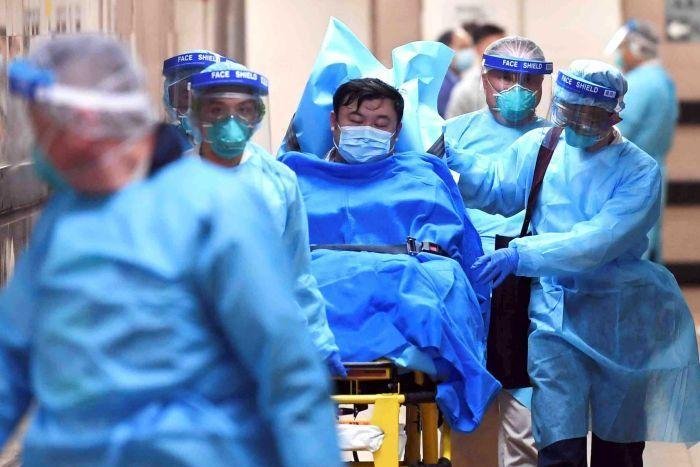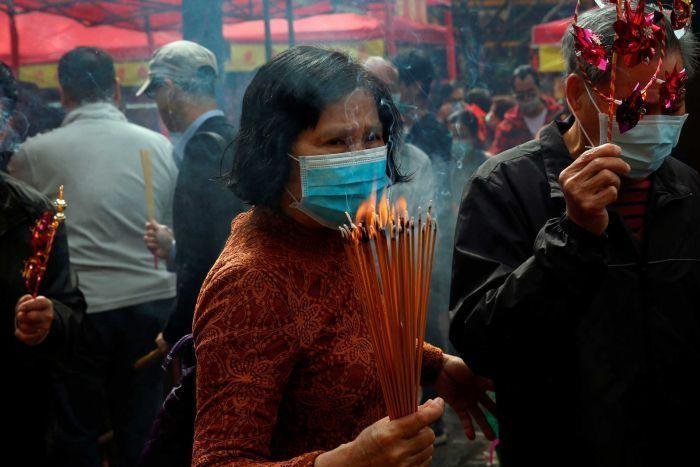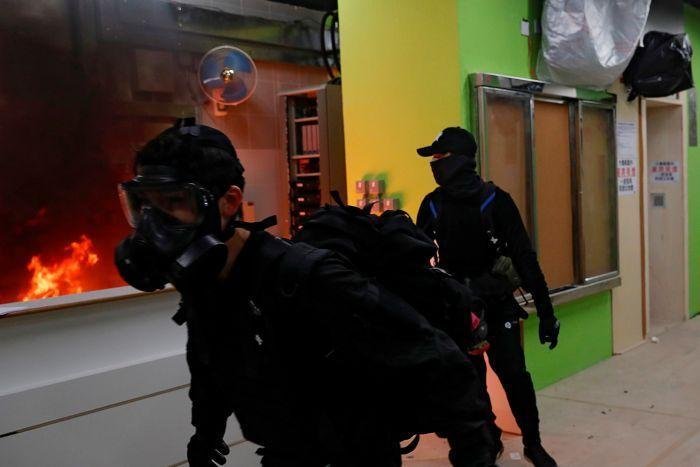The ability of the new coronavirus to spread is strengthening and infections could continue to rise, according to the National Health Commission in China, where nearly 3,000 people have been infected and 81 have died.
There were a total of 2,744 confirmed cases from 30 Chinese provinces and autonomous regions as of yesterday, with “51 cured and discharged patients”, according to Chinese state-owned media.
The number of deaths from the flu-like virus in Hubei province, including Wuhan city, climbed from 56 to 76 overnight, health commission officials said, with four deaths elsewhere in China.
While a small number of cases have been confirmed in more than 10 countries, no fatalities have been reported elsewhere.
Chinese Premier Li Keqiang visited Wuhan, the epicentre of an outbreak of the new coronavirus, on Monday.
Mr Li, the most senior leader to visit Wuhan since the outbreak began, went to the city to inspect the ongoing efforts to contain the epidemic and spoke with patients and medical staff, a report released by the Chinese Government said.

China extended its Lunar New Year holiday by three days to discourage people from traveling as it tried to contain the spread of the virus, the Government said on Monday.
Delaying the official end of the holiday was designed to “effectively reduce mass gatherings” and “block the spread of the epidemic,” a Cabinet statement said.
Schools will postpone reopening after the holiday until further notice, the statement said.
The outbreak has prompted widening curbs on movement within China, with Wuhan — the city where the virus is believed to have started — on virtual lockdown, with transports links all but severed except for emergencyvehicles.
Wuhan Mayor Zhou Xianwang said traffic restrictions in central Wuhan were not designed to prevent citizens from escaping, but instead to “control the flow of people”, adding 5 million people had left the city while 9 million remained.
A handful of cases have been reported outside China, including in Australia, Thailand, Vietnam, Singapore, Nepal, Malaysia, the United States and France, with health authorities around the world racing to prevent a pandemic.
The newly identified coronavirus has created alarm because there are still many unknowns surrounding it, such as how dangerous it is and how easily it spreads between people. It can cause pneumonia, which has been deadly in some cases.
China’s National Health Commission Minister Ma Xiaowei said the incubation period for the virus could range from one to 14 days.
The Minister also said the virus was infectious during incubation, which was not the case with Severe Acute Respiratory Syndrome (SARS), but Australian authorities are seeking further advice from global medical experts to confirm if this is the case.
SARS was a coronavirus that originated in China and killed nearly 800 people globally in 2002 and 2003.
“According to recent clinical information, the virus’s ability to spread seems to be getting somewhat stronger,” Mr Ma told a packed media briefing on the second day of the Lunar New Year holiday.
He said the knowledge of the virus was limited.
Containment efforts, which have thus far included transportation and travel curbs and the cancellation of big events, will be intensified, Mr Ma said.
The virus, believed to have originated late last year in a seafood market in the central Chinese city of Wuhan that was illegally selling wildlife, has spread to cities including Beijing and Shanghai. Hong Kong has six confirmed cases.
President Xi Jinping said on Saturday that China was facing a “grave situation”.
The US State Department said it would relocate personnel at its Wuhan consulate to the United States and would offer a limited number of seats to private US citizens on a January 28 flight to San Francisco.
France said it expected to move hundreds of its 800 citizens out of the Wuhan area in China mid-week.
Evacuees will have to spend 14 days in quarantine to mitigate the risk of spreading the virus in France.
French Health Minister Agnes Buzyn said any decision to ban flights from China would have to be taken by the European Union and rejected calls for temperature screening of passengers flying in from China, saying it was ineffective.
Japanese Prime Minister Shinzo Abe said on Sunday his government was working with Chinese authorities to arrange a charter flight for any Japanese nationals who wished to return from Wuhan.
Health officials in Orange County, California, reported that a third case of the new coronavirus had been registered in the United States, in a traveller from Wuhan who was in isolation and in good condition.
On Saturday, Canada declared a first “presumptive” confirmed case in a resident who had returned from Wuhan. Australia confirmed its first four cases.
Airports around the world have stepped up screening of passengers from China, although some health officials and experts have questioned the effectiveness of such screenings.
Nationwide ban on the sale of wildlife
On Sunday, China announced a nationwide ban on the sale of wildlife in markets, restaurants, and e-commerce platforms.
Local authorities will “strengthen inspections and severely investigate and punish those who are found in violation of the provisions of this announcement,” read the the ban issued by Chinese government agencies.
No wildlife can be transported or sold in any markets or online, according to text of the announcement in state media.
Beijing says the ban will remain in place until “the epidemic situation is lifted nationwide” in order to help prevent the spread of the new coronavirus and block potential sources of infection and transmission.
Wild and often poached animals packed together in Chinese markets are blamed as incubators for viruses to evolve and jump the species barrier to humans.
Snakes, peacocks, crocodiles and other species can also be found for sale via Taobao, an e-commerce website run by Alibaba.
The World Health Organisation this week stopped short of calling the outbreak a global health emergency, but some health experts question whether China can continue to contain the epidemic.
Schools and universities to remain shut in China
The outbreak has overshadowed the start of the Lunar New Year, when hundreds of millions of Chinese travel home and abroad to be with families, with public events cancelled and many tourist sites shut.

Overall passenger travel declined by nearly 29 per cent on Saturday, the first day of the Lunar New Year, from a year earlier, with air passengers down nearly 42 per cent, a transportation ministry official said.
Many cinemas across China are also closed with major film premieres postponed, slashing revenues.
Cruise operators including Royal Caribbean Cruises, Costa Cruises, MSC Cruises and Astro Ocean Cruises said that they cancelled a combined 12 cruises that had been scheduled to embark from Chinese ports before February 2.
Hong Kong Disneyland and the city’s Ocean Park were closed on Sunday. Shanghai Disneyland, which expected 100,000 visitors daily through the Lunar New Year holidays, has already closed.
Health authorities in Beijing urged people not to shake hands but instead salute using a traditional cupped-hand gesture. The advice was sent in a text message that went out to mobile phone users in the city on Sunday morning.
Beijing is also postponing the reopening of the city’s schools and universities after the Lunar New Year holiday, state radio reported. Hong Kong had already delayed the reopening of schools to February 17.
China has called for transparency in managing the crisis, after a cover-up of the spread of the deadly SARS virus eroded public trust, but officials in Wuhan have been criticised for their handling of the current outbreak.
“People in my hometown all suspect the real infected patients number given by authorities,” said Violet Li, who lives in the Wuhan district where the seafood market is located.
“I go out with a mask twice a day to walk the dog — that’s the only outdoor activity,” she told Reuters by text message.
Urgent hospital construction, appeal for resources
The National Health Commission said it was bringing in medical teams from outside Hubei to help handle the outbreak, a day after videos circulating online showed throngs of frantic people in masks lined up for examinations and complaints that family members had been turned away at hospitals that were at capacity.
At least eight hospitals in Wuhan issued public calls for donations of masks, goggles, gowns and other protective medical gear, according to notices online.

In rare show of public dissent, a senior journalist at a Hubei provincial newspaper run by the ruling Communist Party on Friday called for a “immediate” change of leadership in Wuhan on the Twitter-like Weibo. The post was later removed.
State media reported that Wuhan authorities had ordered the construction of a second dedicated hospital to treat patients suffering from the virus.
The hospital, designed to have 1,300 beds, is scheduled for completion in just two weeks.

Construction has started on the first dedicated hospital, which is due to be finished by February 3.
The Chinese military dispatched 450 medical staff, some with experience in past outbreaks including SARS and Ebola, who arrived in Wuhan late on Friday night to help treat the many patients hospitalised with viral pneumonia, the official Xinhua News Agency reported.
The Ministry of Commerce is coordinating an effort to supply more than 2 million masks and other products from elsewhere in the country, Xinhua said.
On Friday, US President Donald Trump praised China’s handling of the coronavirus on Twitter.
“China has been working very hard to contain the coronavirus. The United States greatly appreciates their efforts and transparency. It will all work out well. In particular, on behalf of the American people, I want to thank President Xi!” Mr Trump wrote.
Hong Kong protesters torch planned virus quarantine building
Meanwhile, a group of protesters set alight the lobby of a newly built residential building in Hong Kong on Sunday that authorities planned to use as a quarantine facility for the coronavirus outbreak.
A Reuters witness saw several masked protesters, clad in black, rush into the public housing block in the Fanling district near to the border with China, and set alight a Molotov cocktail before running out.
Black smoke could be seen pouring out of the building to the sound of fire alarms. Windows were smashed.
The fire was later put out by firefighters and the damage appeared to be confined to the lobby area. Hundreds of riot police also moved in, arresting at least one person.
As fears about the virus outbreak intensify, calls have grown for the Hong Kong Government to block the financial hub’s border with mainland China to minimise the risk of infection.

Earlier in the afternoon, hundreds of regular Hong Kong citizens had blocked roads leading to the building with bricks and other debris, to protest plans to convert the building into a quarantine zone as the number of confirmed cases in the city climbed to six.
“We are dissatisfied with the Government selecting this housing estate as a [quarantine] separation village as it’s very close to a residential area and a primary school,” said a 28-year-old resident surnamed Tsang.
Hong Kong has been convulsed with protests over the past seven months, centred on Hong Kong’s relationship with mainland China, with some protesters railing against what they see as growing interference from Beijing.
Beijing denies meddling and blames the West for stirring trouble in the former British colony.
The outbreak of the coronavirus from the Chinese city of Wuhan has piled further pressure on embattled Hong Kong authorities, who have so far refused to categorically block the flow of visitors from mainland China across several land border crossings.
Direct train and flight connections to and from Wuhan have, however, been suspended.
On Sunday authorities also barred residents of China’s Hubei province, the centre of the coronavirus outbreak, from entering the city.
Hong Kong authorities had earlier said they would convert “Fai Ming Estate, an unoccupied public estate in Fanling, into temporary flats for quarantine and observation of close contact persons without symptoms if needed”.
But after the protest, the Government said in a statement it would “cease the related preparation work in Fai Ming Estate”.
Health authorities in the afternoon said 107 people were now under quarantine, and there were 77 suspected cases.
Story Credit: abc.net.au